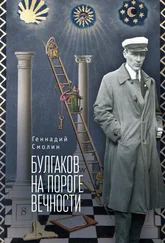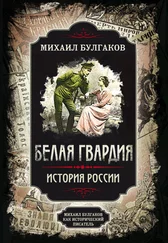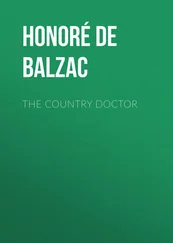‘What’s on his mind?’ I wondered, glancing at him. I had always been intrigued by Doctor Yashvin. Somehow his appearance did not match his profession. Strangers always took him for an actor. He had dark hair but a very white skin, and this made him both conspicuous and attractive. He was very smoothly shaven, he dressed impeccably, was extremely fond of the theatre and could discuss it with great taste and knowledge. But what really distinguished him from our interns and from my other guests that evening were his shoes. There were five of us in the room and four were wearing cheap box-calf boots with clumsy, rounded toes, but Doctor Yashvin wore pointed patent leather shoes and yellow spats. I must add, though, that Yashvin’s dandyish appearance was never exactly offensive and, to give him his due, he was a very good doctor. He was bold, successful, and most important, he found time to keep up his reading, in spite of regular visits to The Valkyrie and The Barber of Seville .
His shoes, however, were not the most interesting thing about him. What fascinated me was one remarkable characteristic: his gift, which he would occasionally display, of being a marvellous raconteur, even though he was usually a quiet and decidedly withdrawn man. He spoke very deliberately without striving for effect, without the average man’s redundant verbiage and humming and hawing, and always on very interesting topics. The reserved, elegant doctor seemed to light up, his pale right hand making occasional short, smooth, economical gestures as if he were punctuating his account with little milestones in the air; he never smiled when telling something funny, and his similes were sometimes so apt and colourful that as I listened to him I was always disturbed by one thought:
‘You are a very good doctor, but you’ve chosen the wrong career. You should have been a writer.’
Now, too, this thought flashed through my head, even though Yashvin was not talking but screwing up his eyes at the figure ‘2’ and at some imaginary object in the distance.
‘What is he looking at? Maybe there’s a picture.’ I looked over my shoulder and saw that the picture was totally uninteresting. It depicted an improbable-looking horse with an exaggerated chest and next to it an engine. The caption read: ‘Comparative size of horse (one horsepower) and engine (500 horsepower).’
‘This is all nonsense,’ I said, continuing the conversation. ‘Banal prejudice. People are most unfair to doctors and to us surgeons in particular. Just think: a man does a hundred appendectomies and the hundred and first patient expires on the operating table. Is that murder?’
‘They’re bound to say it is,’ Doctor Gips replied.
‘And if the patient is a married woman, the husband will come to the surgery and throw a chair at you,’ Doctor Plonsky affirmed confidently; he even smiled, and we all smiled, although there is nothing very funny about people hurling chairs around the surgery.
‘I can’t bear it, because it rings so false, when someone says penitentially: “I have killed, ah me, I’m a murderer” ’ I continued. ‘No doctor murders anyone, and if someone dies on you, then it’s just bad luck. No, really, it’s simply a joke! Murder is not part of our profession. How can it be? I call murder the premeditated killing of a person, or if you insist, the desire to kill him. A surgeon with a pistol in his hand—that, I’ll admit, might be murder. But I’ve never met any such surgeon in my life, nor am I likely to.’
As Doctor Yashvin suddenly turned his head towards me, I noticed that his expression had become grim. He said:
‘I am at your service.’
At the same time he tugged at his tie and once again gave a crooked grin with one corner of his mouth, though not with his eyes.
We looked at him in astonishment.
‘What do you mean?’ I asked.
‘I have killed a man,’ he explained.
‘When?’ I asked absurdly.
Yashvin pointed to the number ‘2’ and answered:
‘It’s an extraordinary coincidence. As soon as you started talking about death, I noticed the calendar and saw that it was the second. But in any case I remember this night every year. You see, seven years ago to the very night, and even, indeed …’ Yashvin pulled out his black watch and glanced at it, ‘… yes, almost to the very hour, on the night of the 1st and 2nd of February, I killed him.’
‘A patient?’ Gips asked.
‘Yes, a patient.’
‘But not deliberately?’ I asked.
‘Oh, I can guess,’ Plonsky, the sceptic, remarked through clenched teeth. ‘He probably had cancer and was dying in torment, and you gave him ten times the normal dose of morphine.’
‘No, morphine had nothing to do with it. Nor did he have any sort of cancer. The weather was frosty—I remember it perfectly—about fifteen degrees below zero, and there were stars in the sky. Ah, what stars there are in the Ukraine. I’ve been living in Moscow almost seven years, but I still feel drawn to my homeland. My heart aches, I get a terrible urge to board a train and be off. To see the cliffs covered in snow, the Dnieper … there’s no more beautiful city in the world than Kiev.’
Yashvin put the calendar page in his wallet, curled himself up in the armchair and went on:
‘It was a grim city, at a grim time … and I saw terrible things, such as you in Moscow never saw. This was in 1919, on the first of February as it happens. It was twilight, about six o’clock in the evening. I found myself doing something rather strange in that twilight. A lamp was burning on the desk in my study, the room was warm and cosy, but I was sitting on the floor bending over a small suitcase, cramming it with all sorts of rubbish, and whispering to myself:
‘ “Must get away, must get away …”
‘I would put in a shirt and take it out again—the damn thing wouldn’t fit in. The case was tiny, my underpants took up so much space, then there were hundreds of cigarettes and my stethoscope, all of which were bulging out of the bag. I flung the shirt away and pricked up my ears. The windowframes were sealed with putty for the winter, so the sound was deadened, but you could still hear it … far, far away there was a low rumble, like something being dragged along—boo-oom, boo-oom … Heavy guns. The echo would die away, and then silence. I looked out of the window—I lived on a steep slope, at the top of St Aleksei’s Hill, and I could see the whole of Podol, the Lower City. Night was drawing in from the west, the direction of the Dnieper, enveloping the houses, and rows of windows were lighting up. Then followed another salvo. And each time a rumble came from the far side of the Dnieper, I would whisper:
‘ “Go on, keep it up.”
‘This was the situation: the whole city knew that Petlyura was just about to abandon it—if not that night, then the next night. The Bolsheviks were advancing from the west bank of the Dnieper and rumour had it that they were in great strength. I must admit that the whole city was not merely impatient but even enthusiastic for their arrival. The atrocities committed by Petlyura’s men in Kiev for the last month that they held it were beyond anything you can imagine. Pogroms were whipped up every minute and people were murdered daily, especially Jews of course. Whenever they wanted to requisition something, cars would hurtle through the city manned by troops wearing fur hats with tassels of red braid, and there had been ceaseless gunfire in the distance for the last few days. Night and day. Everyone was in a state of something like exhaustion, with a frightened, hunted look. Only the day before, two corpses had been lying in the snow under my windows for half a day. One was wearing a grey overcoat and the other a black peasant shirt; neither had boots. Passers-by either shied away or gathered in crowds to stare, and a few bareheaded peasant women darted out of gateways, shook their fists at the sky and shouted:
Читать дальше
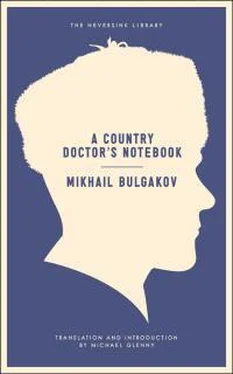
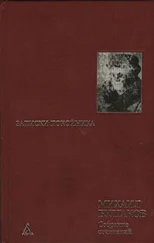
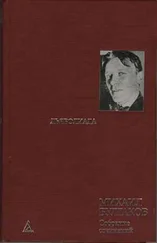
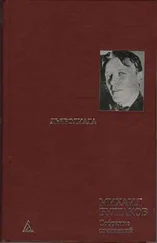
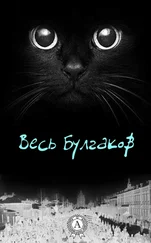
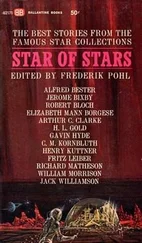
![Михаил Булгаков - Весь Булгаков [litres; сборник]](/books/400110/mihail-bulgakov-ves-bulgakov-litres-sbornik-thumb.webp)


